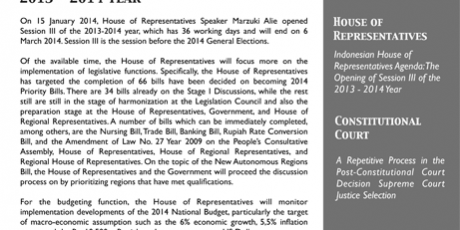House of Representatives
Indonesian House of Representatives Agenda: The Opening of Session III of the 2013-2014 Year
On 15 January 2014, House of Representatives Speaker Marzuki Alie opened Session III of the 2013-2014 year, which has 36 working days and will end on 6 March 2014. Session III is the session before the 2014 General Elections.
Of the available time, the House of Representatives will focus more on the implementation of legislative functions. Specifically, the House of Representatives has targeted the completion of 66 bills have been decided on becoming 2014 Priority Bills. There are 34 bills already on the Stage I Discussions, while the rest still are still in the stage of harmonization at the Legislation Council and also the preparation stage at the House of Representatives, Government, and House of Regional Representatives. A number of bills which can be immediately completed, among others, are the Nursing Bill, Trade Bill, Banking Bill, Rupiah Rate Conversion Bill, and the Amendment of Law No. 27 Year 2009 on the People’s Consultative Assembly, House of Representatives, House of Regional Representatives, and Regional House of Representatives. On the topic of the New Autonomous Regions Bill, the House of Representatives and the Government will proceed the discussion process on by prioritizing regions that have met qualifications.
For the budgeting function, the House of Representatives will monitor implementation developments of the 2014 National Budget, particularly the target of macro-economic assumption such as the 6% economic growth, 5,5% inflation target, and the Rp. 10.500,- Rupiah exchange rate per one US Dollar.
In the supervising function implementation, each House of Representatives Supervisory Team will continue their duties. They are the Land Dispute and Agrarian Conflict Team, the Protection of Indonesian Migrant Workers Team, the Implementation of Special Autonomy in Aceh and Papua Monitoring Team, and the Century Bank Case Settlement Team. Still in line with its supervising function, the House of Representatives will oversee the performance of the Financial Services Authority (Otoritas Jasa Keuangan / OJK) and the Social Security Agency (Badan Penyelenggara Jaminan Sosial). (RR)
Constitutional Court
A Repetitive Process in the Post-Constitutional Court Decision Supreme Court Justice Selection
House of Representative’s Commission III is currently conducting a fit and proper test towards three Supreme Court Justice candidates in order to determine approval or rejection of the three proposed by the Judicial Commission. The current Supreme Court Justice Selection process is the first one after the Constitutional Court issued Decision No. 27/PUU-XI/2013, which states that the meaning of the word “selection” in paragraph (2), (3), and (4) of Law No. 3 Year 2009 should be amended or read with the meaning of “approval”. While in article 18 paragraph (4) of Law No. 18 Year 2011, the meaning of “proposal of three Supreme Court Justice Candidates” should be read as “one Supreme Court Justice needed”.
The mentioned Constitutional Court Decision has brought along change in the selection process; the largest one being that the House of Representatives no longer has the authority to select Supreme Court Justice candidates. Their part on the selection process is only to approve or not candidates proposed by the Judicial Commission. Even so, House of Representatives Commission III has yet chosen to hold the fit and proper test. The Constitutional Court Decision indeed does not prohibit the means used by the House of Representatives in making its decision, but by continuing to perform the fit and proper test, it is clear that the selection process between what is implemented by the Judicial Commission and the House of Representatives is not sustainable. The practice during the fit and proper test by House’s members actually is to repeat the process done by the Judicial Commission.
The House of Representatives must be able to execute the Supreme Court Justice selections in a transparent and accountable manner. Should the House of Representatives choose to conduct the fit and proper test, they should have a standardized assessment, thus not only relying on subjective assessments. In addition, whatever the mechanism used in decision-making, and whatever the decision result, the House of Representatives must be able to keep the verbatim and documented it in writing. Documentation is key for public transparency; whatever comes out from selection process. (FN)
Constitutional Court
Constitutional Court Decision on the Interpretation of “Immediately” (“Segera”) in Article 18 paragraph (3) of the Law on Criminal Procedure
In the decision towards the judicial review of Article 18 paragraph (3) of Law No. 8 Year 1981 on the Law on Criminal Procedure, the Constitutional Court has interpreted the word “immediately” (“segera”) to be understood as “for 7 days”. Article 18 paragraph (3) of the Law on Criminal Procedure mentions “the copy of the arrest warrant referred to in paragraph (1) must be given to his/her family immediately after the arrest has been made”. In its consideration, the Constitutional Court have based differences on the distance, scope, and geographical conditions of regions in Indonesia in affecting the possibility of the time period needed being more than 3 x 24 hours. Therefore, 7 days is a logical deadline.
The Institute for Criminal Justice Reform (ICJR) has questioned the decision. In their opinion, the 7 day period decided by the Constitutional Court is too long to simply give a copy of an arrest warrant to the suspect’s family. Furthermore, with the suspect’s identity, as stated in the arrest warrant (Article 18 paragraph (1)), officials should have already anticipated the possibilities of distance, scope, and geographic conditions in the various regions of Indonesia.
ICJR has observed that all this time, control of action or forceful measures by investigators have been minimal. The deadline of 7 days merely expands the possibility of arbitrariness because of the absence of supervision; seeing as that the time period is quite long, and that the modes of communication towards informing the suspect’s families in Indonesia is further improving. (RR)

